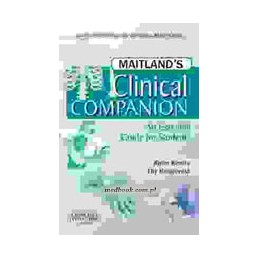- Reduced price

Order to parcel locker

easy pay


 Delivery policy
Delivery policy
Choose Paczkomat Inpost, Orlen Paczka, DHL, DPD or Poczta Polska. Click for more details
 Security policy
Security policy
Pay with a quick bank transfer, payment card or cash on delivery. Click for more details
 Return policy
Return policy
If you are a consumer, you can return the goods within 14 days. Click for more details
The principles of the Maitland Concept of Manipulative Physiotherapy are applied to each body region so as to guide the student through to the appropriate selection, application and progression of mobilisation and manipulation techniques within the context of contemporary physiotherapeutic rehabilitation.
A vital companion to the classic texts - Vertebral and Peripheral Manipulation - which promotes a patient-centred approach to neuromusculoskeletal disorders.
Data sheet
